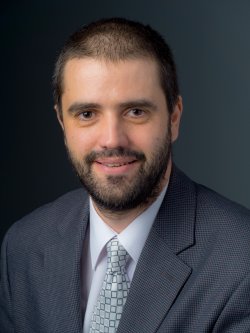
View Profile Page

Stefan Robila
Professor, School of Computing, College of Science and Mathematics
- Office:
- Center for Computing and Information Science 327K
- Email:
- robilas@montclair.edu
- Phone:
- 973-655-4230
- Degrees:
- BS, University of Iasi (Romania)
- MS, Syracuse University
- PhD, Syracuse University
- vCard:
- Download vCard
Profile
Personal Website: https://sites.google.com/view/stefanrobila/
Short Bio:
Dr. Stefan Robila is Professor of Computer Science and the Director of the Computational Sensing Laboratory (https://msuweb.montclair.edu/~robilas/CSL/index.htm).
Between Jan 2018 and Jan 2021 Dr. Robila served as Program Director in the Office of Advanced Cyberinfrastructure (OAC) at the National Science Foundation (https://www.nsf.gov/div/index.jsp?div=OAC). At NSF he developed and managed a portfolio of awards that enable cyberinfrastructure research, development and acquisition as part of regular programs such as OAC Core Research, Cyberinfrastructure for Sustained Scientific Innovation (CSSI), and Major Research Instrumentation (MRI) or in response to immediate needs such as the COVID-19 pandemic through the RAPID mechanism.
Dr. Robila completed his M.S. (2000) and Ph.D. (2002) in Computer Science at Syracuse University and his B.S. (1997) at the University of Iasi (Romania). He joined MSU in 2003 following a one-year appointment as an Assistant Professor of Computer Science at the University of New Orleans. He was a visiting scholar at Cambridge University, University of Oxford (UK), University of Geneva (Switzerland) and Uppsala University (Sweden). He is an ACM and IEEE senior member and IEEE Region I award recipient.
His main research interests are in computational sensing. Dr. Robila has worked extensively with collection and analysis of hyperspectral data, and the development and implementation of computationally efficient feature extraction algorithms that use high performance computing. This work has now expanded into more general research and applications for large data sets. More recently, he has also started working on greening the computing infrastructure as well as cybersecurity. He has published over 100 publications (journal, conference papers, and book chapters).
Dr. Robila has extensive organizer experience managing as PI NSF Research Experience for Undergraduates and Major Research Instrumentation grants, SPIE Educational grants, and a HP Technology for Teaching grant. The 2006 HP grant brought to MSU tablet computers for use in computer courses, and allowed Robila and other faculty the opportunity to investigate tablet technology at an early stage. In addition to NSF, SPIE and HP, Robila’s work has received support from PSEG, Sun Microsystems, New Jersey Council for Humanities and MSU. Robila is actively involved in the dissemination of knowledge related to undergraduate research. Involving CS faculty from eight different universities, he organized panel discussions on undergraduate research presented at computing conferences, in addition to presenting on multidisciplinary research. Dr. Robila external funding surpasses $5.25M.
Dr. Robila's teaching experience spans the Computer Science and IT undergraduate and graduate curriculum and includes all introductory computing courses (taught in Pascal, C, C++, Java and Python), discrete mathematics, operating systems, computer organization, computer security, robotics, pattern recognition, high performance computing, and theory of programming languages.
Specialization
Remote Sensing
Hyperspectral Sensors and Data
Computer Security
Distributed Processing of Remote Sensed Data
Information Hiding in Images
Information Assurance
Energy Efficiency in Data Centers
Computational Sensing
Computer Science Education
Office Hours
Fall
- Tuesday
- 1:25 pm - 2:15 pm
- 4:20 pm - 5:10 pm
- Thursday
- 9:00 am - 9:50 am
Links
Montclair State University does not endorse the views or opinions expressed in a faculty member's webpage or website. Consistent with the principles of academic freedom, the content provided is that of the author and does not express the opinions or views of Montclair State University.
Research Projects
Computational Sensing Laboratory (CSL)
A summary of the current and past activities can be found on the Computational Sensing Laboratory's (CSL) webpage.
Computational sensing is the process of extraction, analysis and use of knowledge about the sensed phenomena. Through computational sensing we aim to address sensing problems through interdisciplinary approaches that include instrument design, phenomena modeling, simulation and experimentation, and especially use of high performance computational environments.
CSL was created in 2003 as a venue that supports both algorithmic design and instrument experimentation. CSL employs a variety of sensing platforms including visible and hyperspectral cameras and diverse computing architectures such as Windows, Unix and Linux workstations as well as two powerful Beowulf clusters.